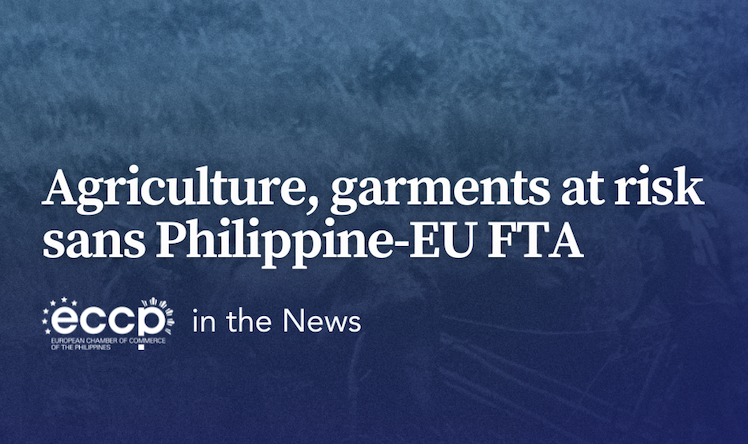
Article by: Louella Desiderio - PhilStar
MANILA, Philippines — The agriculture and garment sectors stand to be the most affected if the Philippines is unable to conclude a free trade agreement (FTA) with the European Union (EU) when the bloc’s trade preference scheme expires, according to the European Chamber of Commerce of the Philippines (ECCP).
This was underscored in the 2025 edition of the ECCP’s advocacy papers providing recommendations in the agriculture; automotive; aviation; customs and logistics; environment and water; food and beverage; health care; human capital and education; infrastructure and information communications technology; renewable energy and energy efficiency; tax and financial services; and tourism industries.
The ECCP’s advocacy papers are aimed at strengthening European-Philippine relations and promoting a business environment that supports investment, innovation and sustainable growth.
“The expiration of GSP+ (Generalized Scheme of Preferences Plus) by 2027 sets a hard deadline. If no FTA is in place, Philippine exporters will lose preferential access to the EU’s 450-million-strong consumer market,”the ECCP said.
“In key sectors like agri-food, garments and tuna, the impact could be severe, with tariff increases reducing competitiveness,” the group said further.
As a beneficiary of the GSP+, the Philippines can export 6,274 products to the bloc at zero tariff.
While the Philippines is enjoying benefits under the GSP+, the country is in talks with the EU for an FTA.
The Philippines and the EU are set to hold FTA talks in Cebu this week following three rounds of negotiations since the resumption of talks in October last year.
While the first round of FTA talks were held in 2016, followed by a second round in 2017, negotiations were put on hold amid the EU’s concerns on the Philippines’ conduct of its war on drugs under the previous administration.
“We hope negotiations come to an end, not only conclusion of negotiations, but also an entry into force of the FTA before the expiration of the GSP+ current system,” EU Ambassador Massimo Santoro told reporters.
“This would be the best way to guarantee we can continue benefiting from the benefits of the GSP+ mechanism, but also to expand these benefits,” he said further.
The EU GSP+ will expire at the end of 2027.
Santoro said the Philippines’ utilization of the GSP+ is high at around 80 percent.
Beyond providing a bridge that will turn a temporary preference scheme to a permanent partnership between the EU and the Philippines, the ECCP said the FTA is also expected to drive growth, competitiveness and sustainability.
“Concluding the agreement on time would safeguard the benefits of GSP+ while amplifying them through expanded trade, new investments and stronger integration into global supply chains,” the ECCP said.
By contrast, it said a delay would risk billions in exports and put to waste a unique opportunity.
“For ECCP and its members, we remain steadfast in converting the current momentum on the EU-Philippines FTA trade negotiations into a lasting partnership that secures growth for decades to come,” the group said.